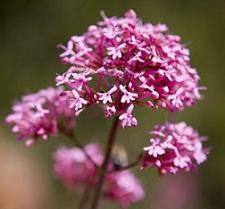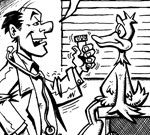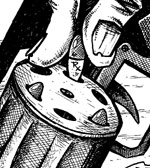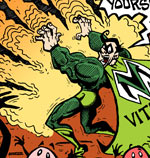Valerian Side Effects Are Rare but Sometimes Require Extra Care
| Share on Facebook | Share on Twitter | Share on Google+ |
Valerian is one of the herbs that used to be known as the "seven sisters of sleep." Prescribed by herbalists for use with hops or passionflower, valerian is very nearly free of side effects, but valerian side effects may require extra care when driving a car or operating heavy machinery.
Finding the Right Valerian Dosage
Most people don't give a lot of thought about how much valerian to take. They just take one capsule or one dropper full if it usually works right away, and two capsules or two droppers full if it doesn't.
And most of the time, this works. However, there is a more precise way to go about dosing valerian. Here are the general guidelines:
- If you are taking valerian in capsule form, take 400 to 900 mg by mouth, with about 1/4 cup (60 ml) of water, about an hour before your desired bedtime.
- If you are drinking valerian tea, brew your tea with one teaspoon (2 to 3 grams) of the herb. Drink all the tea you brew with this dose of the herb about an hour before your desired bedtime.
- If you are using valerian tincture, sometimes called a fluidextract (one word), then take 1 to 3 ml (40 to 60 drops) by mouth. Some people hold the dropper over their mouths and catch the extract on their tongues, but it's a lot easier just to drop the extract into 1/4 cup (60 ml) of room temperature water and then drink, about an hour before your desired bedtime.

There are a lot of variables in determining how much valerian is enough and how much is too much.
- If you are "revved up" when you take the herb, it will take longer for you to "rev down."
- If you take valerian on a full stomach, it will take longer to work than if you take in on an empty stomach.
- If you take the extract in cold water, your body will have to warm up the water before the valerian is absorbed.
Valerian Overdose
Valerian overdose is not very likely, unless you are taking other sleeping aids. Like most herbs, valerian overdosing is a problem primarily when you are taking it for the first time with other sleeping pills or you are taking it after your doctor changed your dosage of another sleeping pill.
It's always best to use valerian by itself to avoid overdosing. At least avoid starting valerian the same week your doctor has upped the dosage of any prescription sleep medication.
What about Valerian Interactions?
The obvious valerian interactions are with alcohol, benzodiazepine tranquilizers, and barbiturates. Since these agents help you sleep and valerian also helps you sleep, combining them can result in next-day drowsiness, increased risk of accidents while driving or operating heavy machinery the next day, or, in the worst case, difficulties breathing.
The not-so-obvious interactions of valerian with prescription drugs are those that occur because of the way the liver processes the active chemical compounds in this herb.
The liver uses an enzyme called CYP450 3A4 to process the valeopotriates in valerian that help you get to sleep. The liver also uses this enzyme to process statin drugs for cholesterol, the active chemical in red yeast rice, some chemicals used to treat yeast and fungal infections, and certain tranquilizers.
Theoretically, taking valerian could cause the listed medications to build up in the bloodstream. In the real world, this has never been observed, but it is still a good idea to err on the side of caution and avoid taking valerian if you take any prescription drugs in these classes.
Other Possible Adverse Effects of Valerian
The common term used to describe the herb valerian in the Latin language during the time of the Romans was the exclamation "Phu!" Valerian is not a sweet-smelling herb. Some people find valerian teas make them just a little nauseous because of the smell. If that is a problem, just take capsules instead.

Some people have allergic reactions to valerian. In rare cases, it can cause itchy rashes or reddening of the skin. If you have an allergic susceptibility to valerian, you will probably notice these reactions when you take your very first dose. If you experience these reactions after you have been taking valerian for weeks or months, the allergy is probably caused by something else.
Headaches, chest palpitations, and unusual sweating occur in a very small number of people who take valerian. There also have been cases of liver toxicity, but these cases involved people who already had viral hepatitis or other chronic liver disease.
Who Should Not Take Valerian?
Valerian is generally considered appropriate for adults only. People who should not take this herb include:
- Children under the age of 12. There are no reports of toxicities when valerian is used by children, but the herb is not proven to be safe.
- Women who are pregnant or breastfeeding. This herb might be passed on to the baby and interfere with normal sleep in the child.
- Anyone who takes L-dopa (sold as carbadopa, Levodopa, or Artane) or pramipexole (sold under the brand names Mirapex, Mirapexin, and Sifrol) for Parkinson's disease. Valerian stimulates dopamine receptors, so the combination of valerian and these drugs might cause unwanted or poorly timed erections in men and greatly increased sex drive in women.
Frequently Asked Questions about Valerian Side Effects
Q. Is valerian safe during pregnancy? Is valerian safe for kids? Is valerian root safe while breastfeeding?
A. The answer to all of these questions is no. Although there is no evidence valerian is harmful in these situations, there is no proof it is safe. Err on the side of caution and avoid giving valerian to children or taking valerian while pregnant or breastfeeding.
Q. Is valerian root addictive?
A. No, although I have heard of one case of a man who was taking Mirapex for Parkinson's disease who got such a boost to libido from taking valerian (it's the combination of the drug and the herb that does this) that he only stopped taking the herb when was no longer able to drive to the natural products shop to get it. (We didn't tell him it was available online.)
Q. Are there any uses of valerian other than helping you go to sleep?
A. Traditionally, this herb has been used for treating menstrual cramps, hot flashes during menopause, "nervous" asthma, hysterical states, migraine headaches, and hypochondria. Before 1900, the herb was also given to children who displayed what we would not call "attention deficit hyperactivity disorder." There have not been any scientific studies of valerian for these applications, although it's not likely to hurt to use the herb as long as you continue to take any prescribed medications. Always let your doctor know about any herbs you take or plan to take.
Q. Will valerian "put me out like a light?"
A. No, valerian usually reduces sleep latency, the amount of time it takes to fall asleep. Typically people can go to sleep within about 10 to 15 minutes after going to bed when they take valerian.
Q. Are there any sleeping pills that I should not take with valerian?
A. It's important to work with your doctor on choices of medications and dosing of medications. Don't try a little of this and a little of that to see if it works. Take your prescribed medication until you and your doctor decide to discontinue it.
That said, any sleeping aid that is also a muscle relaxant can prove to be too much when combined with valerian (or herbal mixtures of valerian, hops, and/or passionflower). The combination of valerian and a benzodiazepine tranquillizer can cause paradoxical effects such as insomnia, worsening of symptoms of borderline personality disorder, or, in people who have epilepsy, increased frequency of seizures.
Q. Please list the names of the benzodiazepine tranquilizers, so I'll know not to take valerian.
A. Here's a list by generic name and major brand names. I've made an effort to contain major brand names that are used in about 95% of the world, but some benzodiazepine drugs may not be on this list. Ask your pharmacist to be sure.
Alprazolam Xanax, Xanor, Kalma, Tafil, Frontal, Alprox
Bromazepam Lexotanil, Lexotan, Bromam, Lexomil, Somalium
Chlordiazepoxide Librium, Tropium, Klopoxid, Risolid
Cinolazepam Gerodorm
Clobazam Frisium
Clonazepam Klonopin, Rivotril
Cloxazolam Olcadil
Clorazepate Tranxene
Diazepam Valium, Vival, Apzepam, Stesolid, Apozepam, Ducene, Hexalid, Valaxona, Antenex
Estazolam ProSom
Flunitrazepam Rohypnol, Ronal Fluscand, Flunipam, Hypnodorm, Rohydorm (Brazil)
Flurazepam Dalmane
Halazepam Paxipam
Ketazolam Anxon
Loprazolam Dormonoct
Lorazepam Ativan, Lorabenz, Temesta
Lormetazepam Loramet, Noctamid, Pronoctan
Medazepam Nobrium
Midazolam Dormicum, Versed, Dormonid, Hypnovel
Nitrazepam Mogadon, Pacisyn, Dumolid, Alodorm
Nordazepam Madar, Stilny
Oxazepam Seresta, Serenid, Serepax, Sobril, Oxascand, Alopam, Oxabenz, Oxapax, Murelax, Alepam
Phenazepam
Pinazepam Domar
Prazepam Centrax
Quazepam Doral
Temazepam Restoril, Normison, Nocturne, Temaze, Euhypnos, Temtabs
Tetrazepam Mylostan
Triazolam Halcion, Rilamir
-
Skin CareMen Skin Care
-
Free ResourcesFree eBooks
-
By creating an artificial environment, we're not stimulating our immune system enough. Germs are immune-stimulants. They challenge you to be prepared.Deepak Chopra
-
What We RecommendIf you do an analysis of the ingredients in a bottle of
 Total Balance and compare with other products you will find that it provides exceptional value for money…even against simple mass produced products with lower bottle costs.
Total Balance and compare with other products you will find that it provides exceptional value for money…even against simple mass produced products with lower bottle costs.
-



















